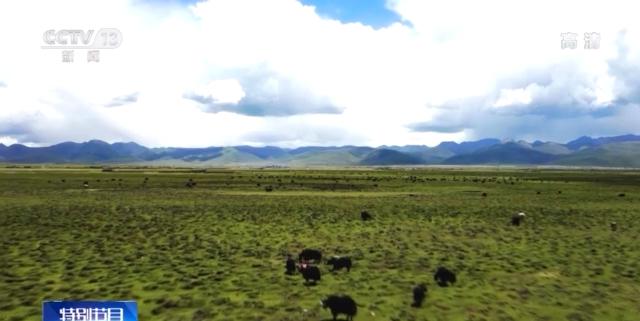Video loading...
Looking at China along the highway, we continue to move forward along the Qinghai-Tibet Line, Tibet as one of the five major pastoral areas in the country, animal husbandry is an important pillar industry, but also the most important industry for the people in pastoral areas to get rich and well-off.
At present, Tibet's animal husbandry industry is bidding farewell to the traditional model of small and scattered, striding towards an intensive, large-scale and industrialized modern animal husbandry industry, and embarking on the road of high-quality development.

Nagqu City, Tibet Autonomous Region, located along the Qinghai-Tibet Highway, built the Garde Ecological Animal Husbandry Industry Demonstration Base in 2018, exploring a new model suitable for the development of pastoral areas in northern Tibet through the purchase of milk, long-term employment, industrial dividends and other forms, driving local herders to a happy and happy new life.
Early in the morning in the milk testing plant, it was a busy scene. Basang, a herdsman in the four villages of Dasa Township in Seni District, drove to the Gard Central Milk Station to sell nearly 70 kilograms of fresh yak milk, and received more than 800 yuan in cash. The Basan family has more than 100 yaks and delivers milk to the base every two or three days.
In addition to helping herders sell milk, the Gard base also provides many jobs for local herders. In the traditional processing plant, ghee, "lala" and yogurt are being produced. These are traditional dairy products in the pastoral area, and the craftsmanship of handmade is preserved to this day.
Processer of The Gard Ecological Animal Husbandry Industry Demonstration Base Gongsang Ram: What I am doing now is "Lala", which herders generally use to entertain guests. I came here in 2018 to work and learn to be "Lala" here. I think it's good to do lala here, with a fixed salary every month.
This year, a modern production plant was built at the Gard base to produce some yogurt with a longer shelf life and bagged milk, attracting many young people to work here.
Employee of the Geld Ecological Animal Husbandry Industry Demonstration Base Ishiram: I graduated this year and work here, and there are more than a dozen college students in our factory.
In 2018, Zabarobu's family moved to Kema Village, Roma Town, next to the Gard base, through poverty alleviation, zabarobu became a milk quality inspector at the base milk source station, his wife Kase milked the cows, and his daughter and son-in-law worked at the base sales store in Lhasa.
Zuba Rob, milk quality inspector of The Grid Ecological Animal Husbandry Industry Demonstration Base: Our family is working in Garde, the family's annual income is about 100,000 yuan, there is no difficulty in life, this is inseparable from the kindness of the party and the country, and we are full of confidence in the future life.
(Edited by Dani Wang)